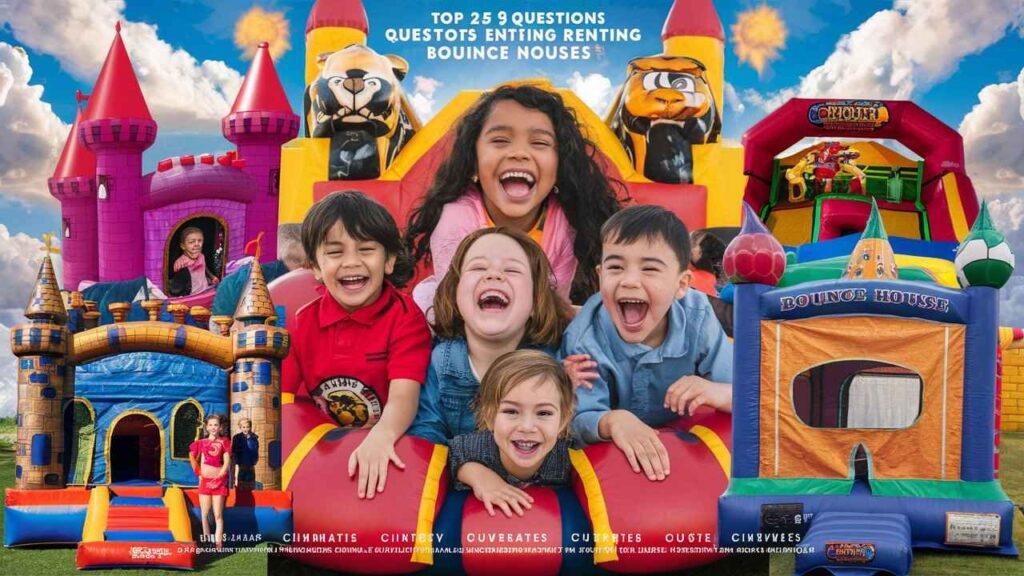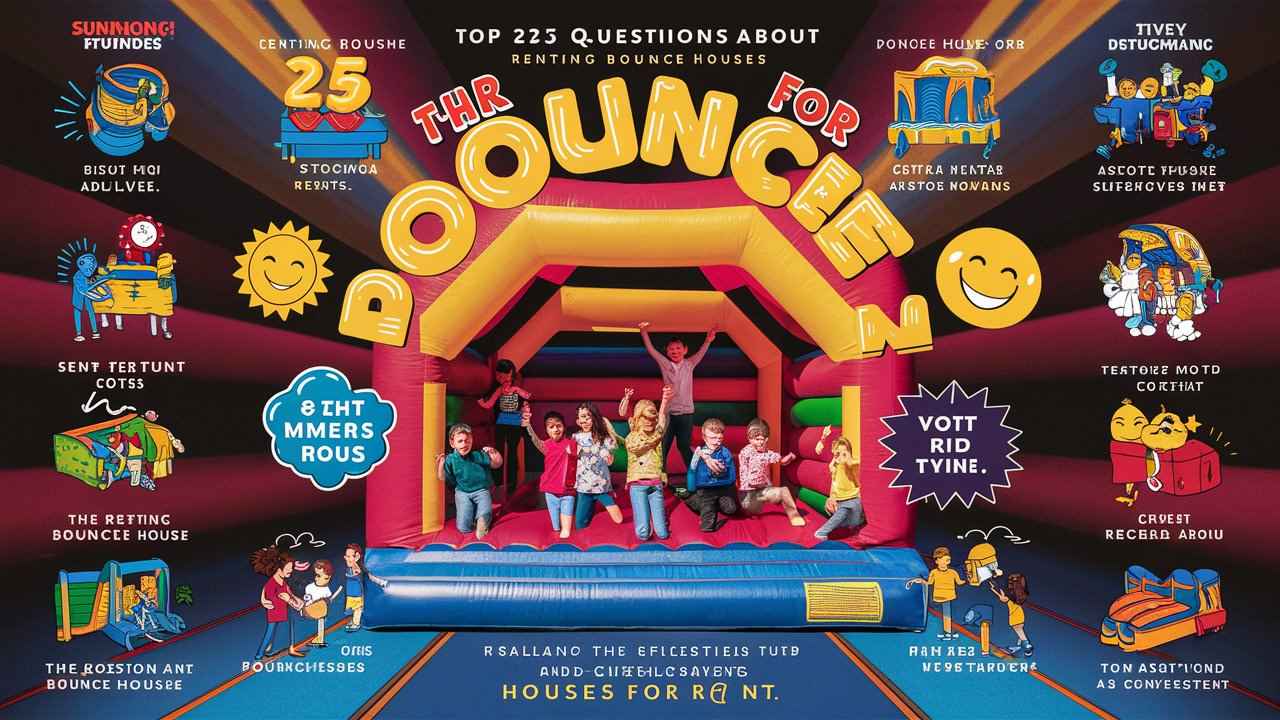Introduction to Bounce House Rentals
Why Bounce Houses? The Ultimate Party Upgrade
If you’re on a mission to elevate your next party, look no further. Bounce Houses are the perfect blend of nostalgia, excitement, and pure entertainment. They transform a basic backyard into a bouncing wonderland. Kids love them, adults secretly love them – it’s like bringing a mini carnival to your own space.

Understanding the Basics: What Exactly is a Bounce House?
A Bounce House is an inflatable structure, typically made of heavy-duty vinyl, designed for jumping, bouncing, and general joy. These inflatable contraptions come in all shapes and sizes, often with added features like slides, obstacle courses, or even basketball hoops. They’re rented for parties and events and add a special touch to gatherings.
Why Are Bounce House Rentals So Popular?
Renting a Bounce House is easy, fun, and often cheaper than other entertainment options. Plus, they’re a surefire way to keep kids entertained (and burn off some of that endless energy). With themes, shapes, and designs, there’s a bounce house that fits nearly every party vibe.

Common Questions About Cost and Booking
How Much Does it Really Cost to Rent a Bounce House?
Most rentals range from $100 to $400, depending on size, duration, and extras. Basic models may be more affordable, while intricate or larger houses (like those with water slides) land on the pricier side.
Are There Additional Fees to Watch Out For?
Some companies add charges for delivery, setup, cleaning, or overtime. Make sure to clarify any hidden fees so you don’t get a surprise on your final bill.
How Far in Advance Should I Book?
Book at least two weeks ahead, especially if your event is during peak season. Bounce houses are popular, and they go fast!

Location, Setup, and Space Requirements
How Much Space Do I Need for a Bounce House?
A standard Bounce House typically requires a 15×15 feet space. Larger models may need more room, so measure your setup area and ask the rental company for specifications.
Can a Bounce House Be Set Up Indoors?
Yes, if the indoor space is tall enough (around 15 feet or more) and can accommodate the dimensions of the house. Make sure there’s a flat surface, like a gymnasium floor or large, open room.
Do Bounce Houses Require Electricity?
Yes, they need a continuous power supply to stay inflated. Usually, this requires a standard 120V outlet, but you might need an extension cord or a generator if no outlet is nearby.
Do I Need Special Flooring or Ground Type for Setup?
Bounce houses work best on flat, soft surfaces like grass. Hard surfaces are possible but might require a tarp for protection.
Can I Set Up a Bounce House on My Own?
Most companies provide setup, but if allowed, you could set it up yourself. Just ensure you secure it well to prevent tipping or sliding.

Safety First: Keeping the Fun Accident-Free
Are Bounce Houses Safe for Kids and Adults?
Yes, if properly used and supervised. Following weight limits, monitoring usage, and using appropriate surfaces can keep everyone safe and injury-free.
How Many People Can Use a Bounce House at Once?
This varies by model, but most Bounce Houses can safely hold around 6-10 children at once, depending on age and size.
What Safety Rules Should I Follow?
Avoid overcrowding, separate age groups, and always supervise. No sharp objects, food, or drinks inside the bounce house to avoid accidents and damage.
Are There Weather Considerations to Be Aware Of?
Yes! Windy or stormy conditions make it unsafe for bounce house use. If winds exceed 15 mph, the bounce house should not be used.

Policies, Permits, and Insurance
Do I Need a Permit for Setting Up a Bounce House?
If setting up in a public park or area, you may need a permit. Check local regulations or ask your rental provider for guidance.
Is Insurance Included in the Rental?
Some companies include insurance, while others may not. It’s best to ask and confirm coverage, especially if your event is large or public.
What is the Cancellation Policy if Weather Turns Bad?
Most companies offer rescheduling options or refunds if inclement weather occurs. Always check the policy in advance, especially if you’re booking during a rainy season.

Special Features, Sizes, and Themes
What Types of Bounce Houses are Available?
From castles and pirate ships to water slides and combo units, the variety is vast. Bounce Houses now come with climbing walls, basketball hoops, and obstacle courses.
Can I Rent Themed Bounce Houses for Specific Events?
Yes! Many companies offer themed options like princess castles, superhero dens, or tropical luau styles. A themed bounce house can add that extra sparkle to a party.
What’s the Difference Between Bounce Houses and Combo Units?
Combo units are bounce houses with added features – think slides, climbing walls, or basketball hoops. They’re ideal for those who want a little extra variety.
Cleaning, Maintenance, and Care
Are the Bounce Houses Cleaned Before Rental?
Reputable companies clean and sanitize their units before every rental. It’s worth asking about their cleaning procedures, especially if it’s a concern.
Do I Need to Clean the Bounce House Before Returning It?
Typically, no. However, you should ensure it’s free of large debris, food, or drinks to avoid extra cleaning fees.
What Happens if the Bounce House Gets Damaged?
If damage occurs, you may be liable. It’s best to discuss insurance or damage fees with the company before renting.
Rules, Regulations, and Age Restrictions
Are There Age or Weight Limits for Bounce House Users?
Yes, bounce houses often have both. These limits keep usage safe and prevent damage to the unit.
Can Adults Use Bounce Houses, Too?
Some models are built for adults, so double-check with the rental company. Adults tend to enjoy the fun just as much as kids!
Rainy Days and What Ifs
What if it Rains on My Rental Day?
If rain is in the forecast, contact your rental company about rescheduling or a refund. They’ll likely have policies for inclement weather.
How Flexible is the Rental Company with Weather Cancellations?
Policies vary, but most companies understand that weather is unpredictable. Discuss flexibility options before booking.
Understanding Rental Terms and Agreements
What Am I Signing? Key Terms in Rental Agreements
Read the rental agreement carefully. It’ll cover terms like cancellation policy, damage liability, and rules for usage. Knowing these details helps avoid surprises.
Is There a Deposit Required?
Some companies require a deposit to secure your booking. Ask upfront and clarify if it’s refundable or transferable.
Frequently Overlooked Details
Are Delivery and Setup Included?
In many cases, yes. Some companies include delivery and setup in the rental price, while others charge separately, so clarify before renting.
Can I Rent the Bounce House for More Than One Day?
Multi-day rentals are usually available, often at a discounted rate. Perfect for weekend-long celebrations!
Bounce House Alternatives and Extras
Are There Other Fun Options Besides Bounce Houses?
Consider inflatables like obstacle courses, slides, or even inflatable games. They can add a unique twist to any event.
Can I Add Extra Features Like Slides or Obstacle Courses?
Yes, combo units or add-on features are often available. Ask about upgrades for a more exciting rental experience.
Top Tips for First-Time Renters
Tips for Getting the Most Fun Out of Your Rental
Keep age groups separate, have an adult supervisor, and plan for weather. Little touches like shade tents and outdoor mats enhance the experience.
How to Choose the Best Bounce House Rental Company
Check reviews, ask about cleaning, and look for companies with flexible, customer-friendly policies.
Conclusion
Final Thoughts: Making the Most of Your Bounce House Rental
A Bounce House is a crowd-pleaser, bringing endless fun for kids and adults alike. Knowing what to expect in terms of setup, safety, and features ensures a smooth rental experience.
Key Takeaways: What Every Renter Should Know Before Bouncing
Plan ahead, prioritize safety, and clarify terms before booking. With the right preparations, your bounce house rental will be a memorable, worry-free addition to any event!
People Also Ask Top 25 Questions
How much is it to rent a bounce house in NJ?
In New Jersey, renting a bounce house typically costs between $150 and $400 for a day, depending on the size, theme, and additional features. Premium models with water slides or obstacle courses might run on the higher end, while standard bounce houses are generally more affordable.
What is the life expectancy of a bounce house?
With proper care, a commercial-grade bounce house can last about 5 to 10 years. Regular maintenance and careful handling can help extend its lifespan, especially if the bounce house is cleaned and stored correctly between uses.
What is the difference between a moon bounce and a bounce house?
“Moon bounce” and “bounce house” are terms often used interchangeably. However, the term “moon bounce” originated with the first inflatables that were smaller and used mainly in amusement parks. Today, both refer to inflatable bouncers but may imply slightly different shapes or themes depending on the region.
How much energy does a bounce house use?
A standard bounce house blower typically uses 1-2 kilowatts per hour, which equates to around $0.10 to $0.25 per hour, depending on local electricity rates. Larger models or higher-powered blowers may use more energy.
What is the best material for a bounce house?
PVC vinyl and heavy-duty nylon are considered the best materials for commercial-grade bounce houses. PVC vinyl is durable, waterproof, and resistant to punctures, making it ideal for heavy use and outdoor settings.
Can you repair a bounce house?
Yes, bounce houses can often be repaired with vinyl repair kits, which include adhesive patches for minor tears. Larger tears or damage to seams may require professional repairs or stitching to restore their durability.
How long can a bounce house blower stay on?
A bounce house blower is designed to run continuously while the bounce house is in use. Most commercial blowers can safely operate for 8 hours or more, provided they don’t overheat and are checked periodically.
How long does it take to clean a bounce house?
On average, cleaning a bounce house takes about 30 to 60 minutes. This includes wiping down the vinyl surfaces, disinfecting high-contact areas, and ensuring that it’s completely dry before storage.
How long do bouncy castles last?
A well-maintained bouncy castle can last 5-10 years. Regular cleaning, proper storage, and avoiding exposure to extreme weather conditions can extend its lifespan significantly.
Are bounce houses sanitary?
Most rental companies clean and sanitize bounce houses before each rental. Regular sanitation, especially on high-touch surfaces, helps reduce germs, making bounce houses generally safe and sanitary when properly maintained.
What is another name for a bounce house?
Common alternative names for a bounce house include bouncy castle, moonwalk, inflatable jumper, and inflatable castle. The name may vary by region or the specific style of the bounce house.
What are the two types of bounce?
In the context of inflatables, the two types of bounce refer to static bouncing, as in a bounce house, and interactive bouncing, such as in combo units with slides or obstacles for added activities.
Why does a bounce house have 2 holes?
Most bounce houses have two openings: one for airflow from the blower and one for ventilation. The extra hole allows excess air to escape, maintaining a stable structure without risking overinflation.
Why can’t you wear shoes in a bounce house?
Shoes can damage the vinyl material of a bounce house and pose a safety risk to users. Removing shoes prevents punctures and keeps the surface cleaner and safer for everyone.
What is the average size of a bounce house?
A standard bounce house typically measures around 13 feet by 13 feet, though sizes can range from 10×10 feet for smaller units to 20×20 feet for larger, more elaborate models.
What do Americans call a bouncy castle?
In the United States, a bouncy castle is often referred to as a bounce house, moon bounce, or inflatable jumper.
Do I need a generator for a bounce house?
If you’re setting up a bounce house in an area without easy access to electricity, a generator is essential. Generators typically range from 2000-4000 watts for adequate power.
How much does it cost to run a bouncy castle?
Running a bouncy castle costs around $0.10 to $0.25 per hour, depending on the blower’s wattage and local electricity rates. A typical 6-hour rental might add up to around $1.50 in electricity costs.
Can you use water on a bounce house?
Certain bounce houses are designed for water use, often referred to as water slides or wet/dry combos. Standard bounce houses aren’t meant for water use, as excessive moisture can damage the material.
How much weight do you need to hold down a bounce house?
Most bounce houses are anchored with stakes or sandbags weighing 50-75 pounds each. The exact weight depends on the bounce house’s size and wind conditions.
What size blower for a bounce house?
A 1 to 1.5 horsepower (HP) blower is standard for most bounce houses. Larger units may require up to 2 HP, while smaller models may use less than 1 HP.
Does a bouncy castle need to be plugged in?
Yes, a bouncy castle must stay connected to a power source for the blower to keep it inflated. Disconnecting the blower will cause the castle to deflate.
What can I put under my bounce house?
A tarp or ground cover beneath a bounce house protects it from debris and sharp objects, helping to keep it clean and in good condition during use.
How to make a bounce house fun?
Enhance a bounce house experience with themed decorations, games, or even glow sticks for nighttime use. Adding slides, ball pits, or obstacle courses can also make it more exciting.
What is the best bouncy material?
PVC vinyl is the most durable and commonly used material for commercial bounce houses due to its strength, water resistance, and ability to withstand frequent use.









